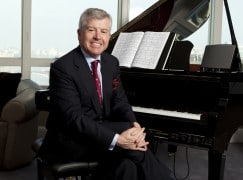ENO’s chairman says he is in a state of shock
OperaThe board of English National Opera has been warned officially three times in the past 15 years that the Arts Council was about to withdraw funding if they continued in denial of financial facts.
Yet the chairman Harry Brünjes, in an article in the New Statesman, maintains that the guillotine came as a complete shock to him.
The only way ENO can possibly survive is for it to be reconstituted with a completely new board and management. Almost every sentence in the text that follows is surreal.
Harry Brünjes writes:
… We were shocked to learn from Arts Council England in a meeting last week that ENO was no longer to be a National Portfolio Organisation – selected leaders in their fields with a responsibility to protect and develop the arts – and our general funding would be cut to zero. We were informed that ENO might be allocated a “transition fund” if it were to relocate from its home for the last 55 years, the London Coliseum, possibly to Manchester. There was no warning, no consultation. We were told for the first time 24 hours before Arts Council England made its plans public, on Friday 4 November. It is only now that the full consequences of this decision are fully understood: the loss of a national institution in London that is approaching its centenary and the loss of livelihood of hundreds of loyal, devoted and talented people.
The suggestion that ENO relocate comes despite the fact that we were specifically advised not to propose a move outside of London in our original application. The suggested transition fund would come to £17 million over the next three years, £20 million less than our usual investment.
ENO has an established reputation for national projects. Manchester is a brilliant city with a fantastic arts ecology but the transition will take time – it could take as long as four years to move – and the ENO has only been given five months left at the Coliseum. We were advised that ENO would retain ownership of the Coliseum but must use it as a commercial asset and make it available for other National Portfolio Organisations to use at favourable rates.
The modern ENO has an excellent relationship with both Arts Council England and the Department for Digital, Culture, Media and Sport….
Read on here and weep.
Shocked, I tell you. Shocked.






Not everyone in UK is an opera goer (or into classical music), so why does it have to come out of taxes. Why shouldn’t the people who really care about opera, ensure that it exists and thrives… with rising operating costs, you have to realize that relying so much on that government subsidy will lead to your downfall. This is another wake up call.
I guess those with kids should pay for schools too, and I’d save a bunch of money!
Schools are a little different – everyone in society needs a school education – but they should be encouraged to support whatever musical/artistic group they are interested in. If opera lovers paid ENO directly – we wouldn’t have to worry about whether someone in government thinks they should get the money. That’s too flimsy.
Not everyone in the UK enjoys sport, but the 2012 Olympics cost £9.3b.
Not everyone in the UK enjoys football, but the public still has to contribute a serious chunk of the cost of policing outside the grounds. Preventing disorder – not a very constructive use of public money.
The problem with subsidies is that people want to pick and choose.
Good point. I hate athletics but appreciate that part of my tax money will go towards the Olympics, stadium maintenance etc.
Because we are not America. Everyone contributes to the greater good.
Well put.
I don’t take public transport but still pay the local taxes which go towards them. The point of subsidising a project is that is becomes available to anyone who’s interested or in need, and that goes for a very wide range of activities and services. I would wager that a great many people involved in opera either as artists, staff or audience members discovered via subsidised ticket prices.
If ENO has assisted the breathing of 2,000 NHS patients, should this not have been paid for by the NHS?
If £12.8m p.a. had been awarded to ENO, then this same amount would have had to have been cut from other London clients, and would not the same aggregate consequences to arts employment in London have resulted?
You have to be ahead of this curve, and learn to invest your own money (in an endowment), and learn how to weather bad years. If the effect of losing government funding means your opera company has to disband – that system doesn’t work.
Couldn’t agree more but, then, I’ve been in business and know about these things. Weathering bad years is part of our family DNA. The risk-reward paradigm is something the majority of people just don’t understand, much less care about.
I’m sorry for the ENO, but the UK now has to do the heavy lifting to ‘save the planet’. You cannot have it all, folks. That kind of mission is going to require sacrifices you haven’t even yet imagined. If I know anything about it at all, you’ll mostly be going without.
Not really – because different orgs spend money / create employment in different ways. Opera/ENO is a big one for employment. Just one example: Bourne ballet company use recorded music to cut staff costs.
So, a cut to that dance company would lead to cutting their dancers, creatives, technical and production staff. They are all human beings, even if they don’t play an instrument for a living.
Why be ‘in a state of shock’. It’s been well understood for a long time now, that London has many artistic institutions with their hands out for public funds. There’s even been talk of merging some of the orchestras for decades. Surely this Chairman and the rest of their board must have considered the possibility of something drastic happening. Yes, it’s a shame! Hopefully they’ll show some resilience and re-locate where there’s a welcome mat for them (instead of nasty reviews, and a well informed but jaded audience). I can’t help but wonder what might have become of N.Y. City Opera, if they had tried to locate to Jersey, or one of the more yuppy neighborhoods in Brooklyn, etc.(instead of just folding).
I think the issue is that to do something drastic, such as relocate or merge with another company, requires time and careful planning.
It starts with consulting all the relevant parties, putting together a strategy and a budget and a timeframe. Once all is in place, make an announcement and go ahead.
What happened here is without specific warning, ENO were given the name of a city and told to go figure it out in the space of 20 weeks. Oh and by the way nobody in said city has been approached either. That’s not a strategy, it’s a disaster, and it’s not going to work, hence the fuss.
I pointed to the example of the NY City Opera in the other thread about the ENO. The NY company closed in 2013 and was revived in a mainly symbolic way a few years later. But just as NYC still has the Metropolitan, London still has the Royal Opera.
How many cities in the world have more than one full-time, big-time opera company? I can’t think of many.
Tokyo, Moscow, St Petersburg, Prague, Vienna, Berlin, Munich, Leipzig, Dresden come to mind.
The Rhine-Ruhr-Area (comparable to London in population) has at least five – or even up to ten, if you include Cologne, Düsseldorf, Bonn.
For some reason, Mandy Rice-Davies has leapt to mind.
I have supported SWO/ENO since the move to the Coliseum and am devastated by this news but also appalled at the way it has been handled by ACE. The Chair and the Board are at the heart of this problem, though, and have been for a long time. After the euphoria of the Lord Harewood years, the Powerhouse productions of the ’80s put ENO at the operatic forefront but, exciting and varied as the productions were, they left the company in a fragile financial situation. The John Berry years were similar with some brilliant productions, albeit also some disasters, but they went beyond the financial means of the organisation. The Board should have exercised tighter control of costs. We could now lose a company which has nurtured so much British talent (John Tomlinson, Anne Evans, Rita Hunter, Norman Bailey, Sarah Connolly, Nicky Spence, Allan Clayton to name a few) and where so many big names made their London debut (Nina Stemme, Bryn Terfel, Antonio Pappano, Michael Fabiano and more).
There is no logic to the ACE decisions. They want to promote work in the regions, so why cut WNO in England, Glyndebourne Touring, Britten Sinfonia who all perform away from the metropolis? This appears to be politically motivated and managed by people out of their depth. Thousands of young people have been introduced to the arts by these companies; a situation which will not be available to youngsters now growing up.
This is a tragedy of immense proprtions and a total disgrace.
Harry Brunjes is a whining ninny, I can say from 8 years of experience with him inside ENO. Just like Stuart Murphy’s humiliating email to all ENO patrons today – begging for their support and letters to MP‘s (How cute, we save ENO with hashtags? About as intelligent as Murphy‘s all Twitter marketing strategies.) Murphy saying he had no idea the cuts were coming, saying he didn’t resign early knowing this was coming – once again, total lies from Murphy, forever talking at the rest of us like we were idiots. The truth is that almost all of us inside knew first hand that this was coming. We could see the writing on the wall when Covid hit, Brexit, Putin‘s War – the global recession was never going to be positive for an opera company already struggling to prove their worth in the land of commercial musicals and West End stars. What is humiliating for these two men, is that they alone are surprised and responsible for this ACE decision. Not the rest of us. Even I support the ACE decision after all these years. World class? Not anymore. Brilliant? Rarely. White male bullies and terrible PR slant? Yes. Stop the lying. You both sunk our boat: face your failure and stop playing naive. Take responsibility for once in your unimpressive lives. You did this. Go with grace.
Seriously. Are we supposed to believe this man? Is he that stupid? After so many years of disastrous choices under his leadership, he is surprised? Just goes to show how utterly incompetent he was from day 1, and why the company is now closing. The ACE should take more notice of the Chairs they appoint: this man was never qualified. And the last 8 years prove that, appointment after appointment.
If Brunjes were a good board chair he would not be in shock – he’s got his head up his arse, so wants to be in the spot light…the writing has been on the wall for years that this organization was in danger. This board is (was) a mess. The Arts Council cut is a sign that your work was NOT good and you need to go away, ALL OF YOU!
When management is surprised by the bottom falling out of the company’s stock – SURPRISED and SHOCKED – then that management is in dereliction of duty. And should be fired.
Maybe some real business people and arts conoscenti could have made a difference in the recent past, and not the posh and political appointees we got. But it’s too late now.
Any successor organisation, to succeed, needs to be free of the pall hanging over ENO.
Ban everything and everyone. All must be put on Universal Credit and sanctioned before being dispatched to Rwanda. I know: I’ve been in business.
Yours
Owen Paterson and the guys at the ERG.
What’s often forgotten in this often binary calculation is the wealth created around arts events: hotel stays, restaurant visits, tourism, shopping etc. About ten years ago, France subsidised the arts to the tune of €9bn p.a. but calculated that they generated €17bn in revenue over the same period. Sounds like money well spent on their part, I’d say.